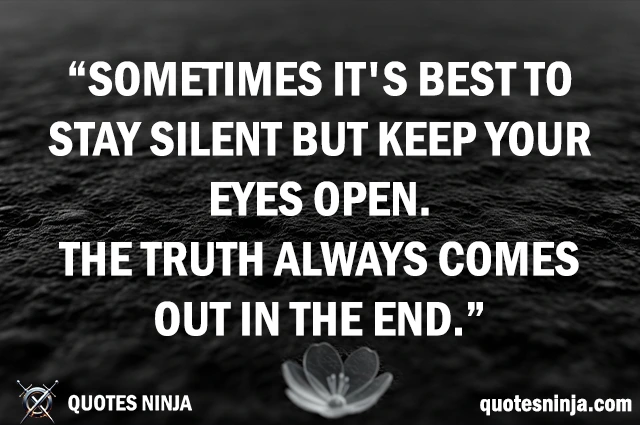
Deeper Meaning of Wisdom Quote
Wisdom Quote: “Sometimes it’s best to stay silent but keep your eyes open. The truth always comes out in the end.”
This quote, tells about patience, observation, and wisdom in the face of difficult or unclear situations.
Here’s a breakdown of the quote:
🔹 “Sometimes it’s best to stay silent”
This suggests that speaking up immediately—especially in moments of conflict, confusion, or emotion—isn’t always the best course of action. Silence doesn’t mean weakness; it can be a strategic decision to avoid making things worse or exposing too much too soon.
🔹 “But keep your eyes open”
Here, silence is paired with alert awareness. While you’re not reacting outwardly, you’re still paying close attention. You’re gathering information, watching people’s actions (which often speak louder than words), and staying aware of what’s really happening beneath the surface.
🔹 “The truth always comes out in the end.”
Over time, truth has a way of revealing itself, often without any help. Lies, deception, or misunderstandings eventually unravel—people slip up, facts emerge, and hidden motives become clear. Your quiet patience allows you to see things more fully and clearly when the time is right.
In essence, be wise. Not everything requires your immediate reaction. Sometimes, the most powerful thing you can do is say nothing, watch everything, and trust that the truth will rise when it needs to.
Here’s a story inspired by Wisdom Quote “Sometimes it’s best to stay silent but keep your eyes open. The truth always comes out in the end.”
Wisdom Story: “The Watchful Sparrow“
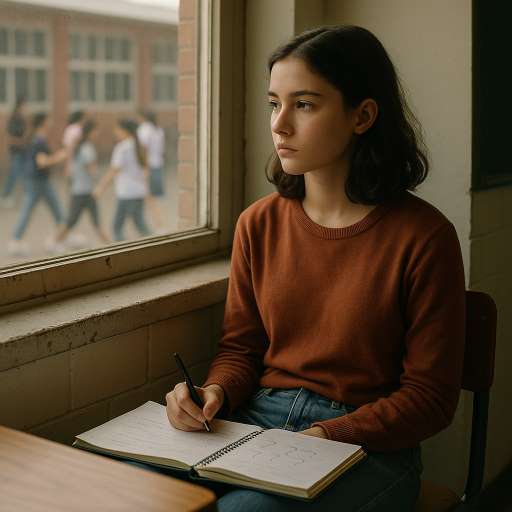
The Quiet Observer:
The small town of Varuna was peaceful, but peace has layers—and sometimes secrets sit just beneath them. In a quiet neighborhood nestled between two hills, lived a teenage girl named Anya. She wasn’t loud or overly curious. Most people would have described her as quiet but sharp-eyed, a girl who didn’t speak much but seemed to notice everything.
At 16, Anya had already learned that speaking up too soon could cause more trouble than staying silent. Her father, once an honest journalist, had lost his job after exposing corruption in a local politician’s office.
Since then, she had watched her family go from respected to ridiculed, all for telling the truth too early—before people were ready to hear it.
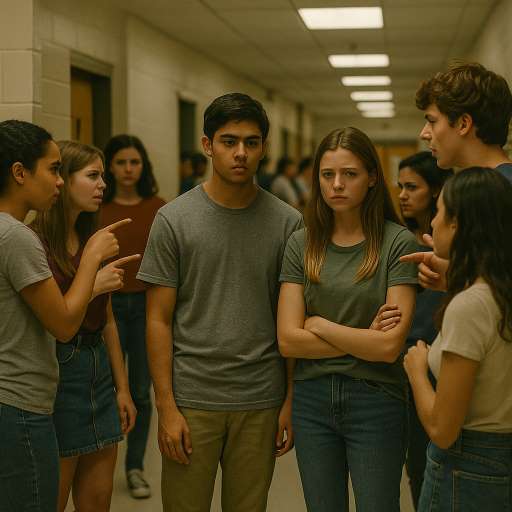
Whispers and Accusations:
One Monday morning, as the school bell rang and the hallways buzzed with chatter, Anya found herself caught in the middle of a whisper war. Someone had been stealing answer sheets before the exams. Accusations flew like arrows. First at a boy named Raghav, then at a girl named Tia. The principal launched an investigation, but no one had real proof.
Curiously, the top scorer of the class, Neel, remained untouched by suspicion. He was charming, well-spoken, and often seen volunteering for school events. Everyone liked him, which made him invisible to blame.
Anya, however, noticed things others didn’t.
She noticed how Neel’s bag looked bulkier on exam days. She noticed him leave the staff room minutes after the teacher stepped out. She noticed his sudden rise in grades last term—after two years of being merely average.
Still, Anya said nothing. She didn’t accuse. She didn’t confront. Instead, she watched. Patiently.
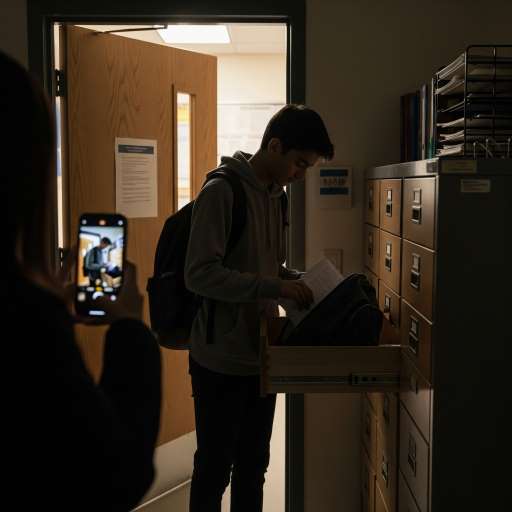
Behind the Curtain:
While others argued in the hallways, she started writing everything down: dates, times, behavior changes. She even used her old phone to take quiet photos of Neel’s movements. Her silence became her shield. But her eyes—they were sharp, always open.
Days turned into weeks, and the pressure at school intensified. Innocent students were getting punished. Friendships were breaking under the weight of suspicion. One afternoon, while sitting alone in the library, Anya overheard a teacher complaining that her desk had been tampered with. That was the final piece of the puzzle.
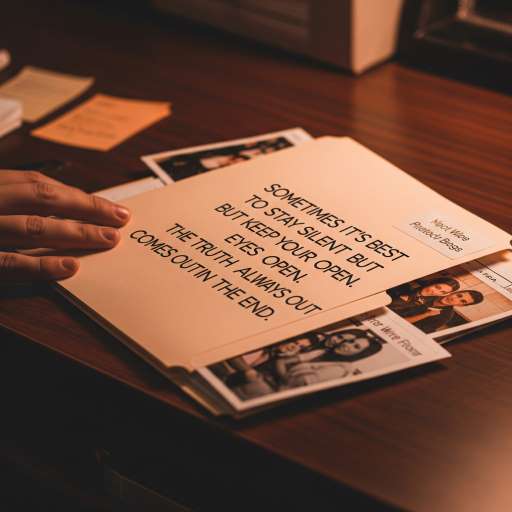
The Evidence Folder:
That night, Anya went through her notes and photos again. Everything pointed to Neel. But instead of confronting him directly, she chose a different path.
She anonymously slipped a folder into the principal’s office the next morning. It contained a log of Neel’s suspicious activities, photographs as evidence, and a brief, simple note:
“Sometimes it’s best to stay silent but keep your eyes open. The truth always comes out in the end.”
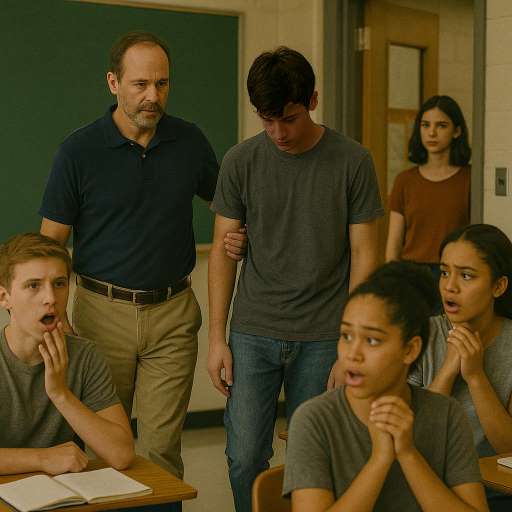
Justice Revealed:
By the end of the week, Neel was caught red-handed trying to break into the staff room. The principal found photocopies of the next math exam in his locker. The truth had surfaced, just like Anya knew it would.
What followed was a school-wide announcement, an apology to those wrongly accused, and a quiet thank-you posted on the bulletin board:
“To the silent observer who trusted truth more than noise—thank you.”
Anya never came forward. She didn’t need applause or attention. She just walked past the bulletin board that day with a soft smile. She had spoken no words—but her eyes had done all the work.
Here is the ending of wisdom Story from the quote “Sometimes it’s best to stay silent but keep your eyes open. The truth always comes out in the end.”
Moral of the story:
Sometimes, it’s not the loudest voice that uncovers the truth—it’s the most observant one. Speaking without evidence can lead to more harm than good. But with quiet patience, watchfulness, and trust in time, the truth always finds a way to rise.
To explore more on stories and dive into related ideas, be sure to check out the other posts where we cover all sort of stories related to quotes. Stay tuned for more…..
To explore more on quote topics, be sure to check out the other topics where we cover all categories of quotes. Stay tuned for more…..

